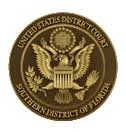With effect from December 1, the U.S. District Court for the Southern District of Florida local rules underwent a modification. Thankfully, this year’s revisions are minor and won’t significantly affect practice in the Southern District for attorneys who work in federal court. Attorneys in this area need to be aware of these changes.
Thankfully, this year’s revisions are minor and won’t significantly affect practice in the Southern District for attorneys who work in federal court.
Below is a summary of them.
S.D. Fla. L.R. 26.1(g) and S.D. Fla. L.R. 26.1(e)(7) Amendments—Due Dates for Filing Discovery Disputes
As attorneys who frequently operate in the Southern District of Florida are aware, there has been a regulation in place for many years that, to put it simply, mandates that discovery disputes be addressed before the court within thirty days. Even though it’s a straightforward idea, adhering to the landing has proven challenging. The rule was changed to clarify S.D. Fla. L.R. 26.1(g) about the timeliness and process for parties to bring discovery disagreements before the court.
First, the added language serves as a reminder to litigants that the district frequently has judge- or case-specific discovery procedures in place. Next, to comply with current federal practice and other local regulations, the 30-day deadline will be shortened to 28 days. Furthermore, a new rule, S.D. Fla. L.R. 26.1(e)(7), mandates that parties notify other parties by serving a Notice of Completion once all relevant documents that are not objectionable have been produced or made available. The timeframe for protesting an inadequate production would begin upon receipt of that notice.
Other changes provide impartiality to the process of determining when to bring up discovery conflicts. One of these is the removal of deadlines that depend on when a party “should have learned of a purported deficiency,” which has added undue subjectivity to the rule and may cause needless confusion and motion practice.
Authorization of Videoconference Mediation—Amendments to Local Rule 16.2
In response to the legal community’s broad adoption of videoconference mediation during the COVID-19 pandemic, the local regulations have been revised to formalize the use of video technology in mediation. The following succinctly describes the new policy and procedure:
The parties may decide to conduct mediation by videoconference without a separate court order if they agree to do so and the court hasn’t issued an order prohibiting it. The new Florida state court rule and this section of the rule arrive at the same conclusion.
Unless the party requesting in-person mediation seeks and obtains a court order requiring in-person participation (in whole or in part), the mediation will be conducted by videoconference if the parties cannot agree and the court has not entered an order prohibiting mediation by videoconference.
However, individual judges still have the authority to mandate in-person mediation, and preliminary reports suggest that some of them are doing so (though this may just be anecdotal).
Revisions to Local Rule 88.10(o) Regarding Expert Witness Disclosures in Criminal Cases
New requirements for thorough expert disclosures were added to Rule 16 of the Federal Rules of Criminal Procedure. However, these disclosures now have deadlines that must be set by order or local regulation. S.D. Fla. L.R. 88.10(o) has been modified as a result to address the due dates for certain disclosures.
The revised S.D. Fla. L.R 88.10(o) discloses information in two levels. The new, more thorough disclosures mandated by the Rule 16 modifications would come after the first, which would be an initial summary disclosure. The Federal Magistrate Judges Association suggested adding deadlines for these more in-depth expert disclosures to the revised Rule 16, and those default dates are based on those adjustments.
Local Rule 88.10(o) has been updated to include the ability for the court to alter the default timelines outlined in the new local rule. The updated rule also requires a party requesting a deadline modification to provide precise justifications and underlying facts that support the change.
Amendments to Rule of Attorney Conduct 4(b)(4) for Pro Hac Vice Motions
Lastly, Rule 4, which governs pro hac vice appearances, has been clarified by amending the regulations. This includes stating the certification that applicants must provide and referring to the motion form that can be found on the court’s website. Significantly, the modified regulation now allows a lawyer representing a client pro hac vice to represent other parties in the same case who weren’t included in the initial pro hac vice motion by merely filing a notice of appearance under the initial pro hac vice admission.
Southern District of Florida Local Rules: Letters to the Judge
Attorneys who practice regularly in the Southern District of Florida are probably already aware of S.D. Fla. L.R. 7.7, which forbids letters to the court. Out-of-state attorneys who may practice in states or federal districts where the idea of a “letter motion” is widely recognized may find this regulation surprising at times. But formerly, the rule simply forbade correspondence from lawyers and parties who were represented by lawyers. In technical terms, this meant that a pro se party was exempt from the rule. This is no longer the case; S.D. Fla. L.R. 7.7 expressly forbids communication between parties and attorneys.
Southern District of Florida Local Rules: Suggestions for Jury Instructions
The statute that deals with jury instructions in civil trials is S.D. Fla. L.R. 16.1(k). Regarding criminal trials, there was no municipal regulation in place at the time that addressed jury instructions in particular. The local regulations on jury instructions have been modified three times. First, S.D. Fla. L.R. 88.9 is titled “Motions In Criminal Cases and Jury Instructions” to incorporate jury instruction in the rule’s title. Then, a new regulation known as 88.9(d) that applies to criminal proceedings states:
When appropriate, the parties will follow the pattern of jury instructions. Any proposed jury instruction must name any supporting authority and state its source unless directed otherwise by a court order. The party must also specify whether the proposed jury instruction is an altered version of the pattern jury instruction and, if so, how it has been altered if the jury instruction’s source is designated as a pattern jury instruction.
The entirety of S.D. Fla. L.R. 88.9(d) has been added to S.D. Fla. L.R. 16.1(k), the analogous rule for jury instructions in civil matters, along with this specific language.
Southern District of Florida Local Rules: An Attorney’s Death
The sad situation where a party’s counsel passes away is addressed by a new rule. According to the new rule, notice of an attorney’s death can be given by any party. Specifically, this rule bridges the legal void left when a lone practitioner representing one party passes away. The new rule states that if the opposing party’s attorney finds out about a death, they now have both the obligation and the right to tell the court. In particular, the rule stipulates that:
Any party who becomes aware of the passing of an attorney involved in a legal action or proceeding—including one in which the attorney participated pro hac vice—must file and serve a “Notice of Deceased Attorney” as soon as possible, with the sole information being that the attorney has passed away. No other notice of the death of an attorney is required to be filed by any other party in a matter once a Notice of Deceased Attorney has been filed.
It is a good idea to remind attorneys that R. Regul. Fl. Bar 1-3.8(e) mandates that each member of the Florida Bar appoint another member to serve as their inventory attorney, even though the new rule does not specifically address this Florida Bar rule. The following is provided by the rule:
Appointing an attorney for inventory. Florida bar members must designate another member to serve as inventory attorney, excluding governmental employee work unless specified. An authorized representative of the Florida Bar will get in touch with the chosen member and ascertain the member’s current willingness to serve if the services of an inventory attorney become necessary. The assigned member will not be required to act as the inventory attorney.
Southern District of Florida Local Rules: FAQs
What Local Regulations Exist Locally?
A collection of formal or informal laws that are enacted locally and enforced to regulate the day-to-day operations or procedural matters of local courts.
What Is Florida’s Local Rule 26.1?
Statement of Corporate Disclosure. (a) Who Needs to Submit? Any nongovernmental corporate party to an appeals court matter is required to provide a declaration either identifying the publicly held company that owns 10% or more of the nongovernmental corporate party’s stock or stating that no such corporation exists.
What is Florida’s Local Rule 16.2?
According to Local Rule 16.2(a), the parties choose whether to arbitrate face-to-face or virtually; if they can’t agree, a video conference will be used. Additionally, the Local Rule mandates that in the event of a non-agreement, the mediator’s report specifies whether the mediation was conducted in person or via video conference.
Summary
On December 1, 2021, a few changes to the Southern District of Florida’s Local Rules went into effect. For those keeping score, which should include every attorney practicing in South Florida federal court, the list of amendments from this cycle is not as long as it is from previous, more recent cycles.
Also, Read



